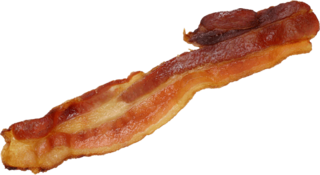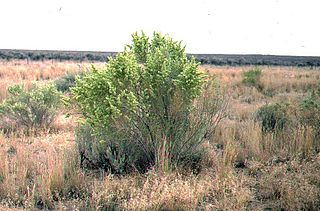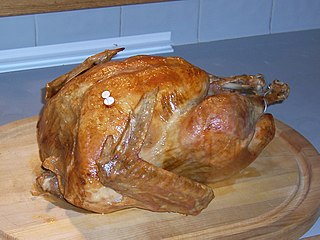
Bacon is a type of salt-cured pork made from various cuts, typically the belly or less fatty parts of the back. It is eaten as a side dish, used as a central ingredient, or as a flavouring or accent.
Sycamore is a name which has been applied to several types of trees, but with somewhat similar leaf forms. The name derives from the ancient Greek συκόμορος (sūkomoros) meaning "fig-mulberry".

Cornbread is a quick bread made with cornmeal, associated with the cuisine of the Southern United States, with origins in Native American cuisine. It is an example of batter bread. Dumplings and pancakes made with finely ground cornmeal are staple foods of the Hopi people in Arizona. The Hidatsa people of the Upper Midwest call baked cornbread naktsi. Cherokee and Seneca tribes enrich the basic batter, adding chestnuts, sunflower seeds, apples or berries, and sometimes combining beans or potatoes with the cornmeal. Modern versions of cornbread are usually leavened by baking powder.
Cypress is a common name for various coniferous trees or shrubs of northern temperate regions that belong to the family Cupressaceae. The word cypress is derived from Old French cipres, which was imported from Latin cypressus, the latinisation of the Greek κυπάρισσος (kyparissos). Cypress trees are a large classification of conifers, encompassing the trees and shrubs from the cypress family (Cupressaceae) and many others with the word “cypress” in their common name. Many cypress trees have needle-like, evergreen foliage and acorn-like seed cones.
Battery most often refers to:

Eggs Benedict is a common American breakfast or brunch dish, consisting of two halves of an English muffin, each topped with Canadian bacon, a poached egg, and hollandaise sauce. It was popularized in New York City.
Butter-and-eggs may refer to:

Queen Anne's lace is a common name for a number of plants in the family Apiaceae. including:

Sium sisarum, commonly known as skirret, is a perennial plant of the family Apiaceae sometimes grown as a root vegetable. The English name skirret is derived from the Middle English 'skirwhit' or 'skirwort', meaning 'white root'. In Scotland it is known as crummock. Its Danish name sukkerrod, Dutch name suikerwortel and German name "Zuckerwurzel" translate as 'sugar root'.

Lotus corniculatus is a flowering plant in the pea family Fabaceae, native to grasslands in temperate Eurasia and North Africa. Common names include common bird's-foot trefoil, eggs and bacon, birdsfoot deervetch, and just bird's-foot trefoil, though the latter name is often also applied to other members of the genus.

Saltbush is a vernacular plant name that most often refers to Atriplex, a genus of about 250 plants distributed worldwide from subtropical to subarctic regions. Atriplex species are native to Australia, North and South America, and Eurasia. Many Atriplex species are halophytes and are adapted to dry environments with salty soils.
Bistort is a common name for several plants and may refer to:

White spruce is a common name for several species of spruce (Picea) and may refer to:
Eggs and bacon may refer to:

Linaria vulgaris, the common toadflax, yellow toadflax or butter-and-eggs, is a species of flowering plant in the family Plantaginaceae, native to Europe, Siberia and Central Asia. It has also been introduced and is now common in North America.
Bachelor's buttons is a common name for several plant species:

A full breakfast is a substantial cooked breakfast meal, often served in the United Kingdom and Ireland, that typically includes back bacon, sausages, eggs, black pudding, baked beans, some form of potato, tomatoes, mushrooms, toast, and a beverage such as coffee or tea. It appears in different regional variants and is referred to by different names depending on the area. While it is colloquially known as a "fry-up" in most areas of the UK and Ireland, it is usually referred to as a "full English", a "full Irish", "full Scottish", "full Welsh", and "Ulster fry", in England, the Republic of Ireland, Scotland, Wales, and Northern Ireland, respectively.

Ranunculus arvensis, the corn buttercup or field buttercup, is a plant species in the family Ranunculaceae. Native to Europe, it can be found on other continents as an introduced species and sometimes a weed, including in North America and Australia. It was formerly a common annual arable weed in Britain, but is now rare there. It is most often found in moist places, such as spring puddles in meadows.
Camphorweed is a common name for several plants and may refer to:

Turkey meat, commonly referred to as just turkey, is the meat from turkeys, typically domesticated turkeys but also wild turkeys. It is a popular poultry dish, especially in North America, where it is traditionally consumed as part of culturally significant events such as Thanksgiving and Christmas, as well as in standard cuisine.











